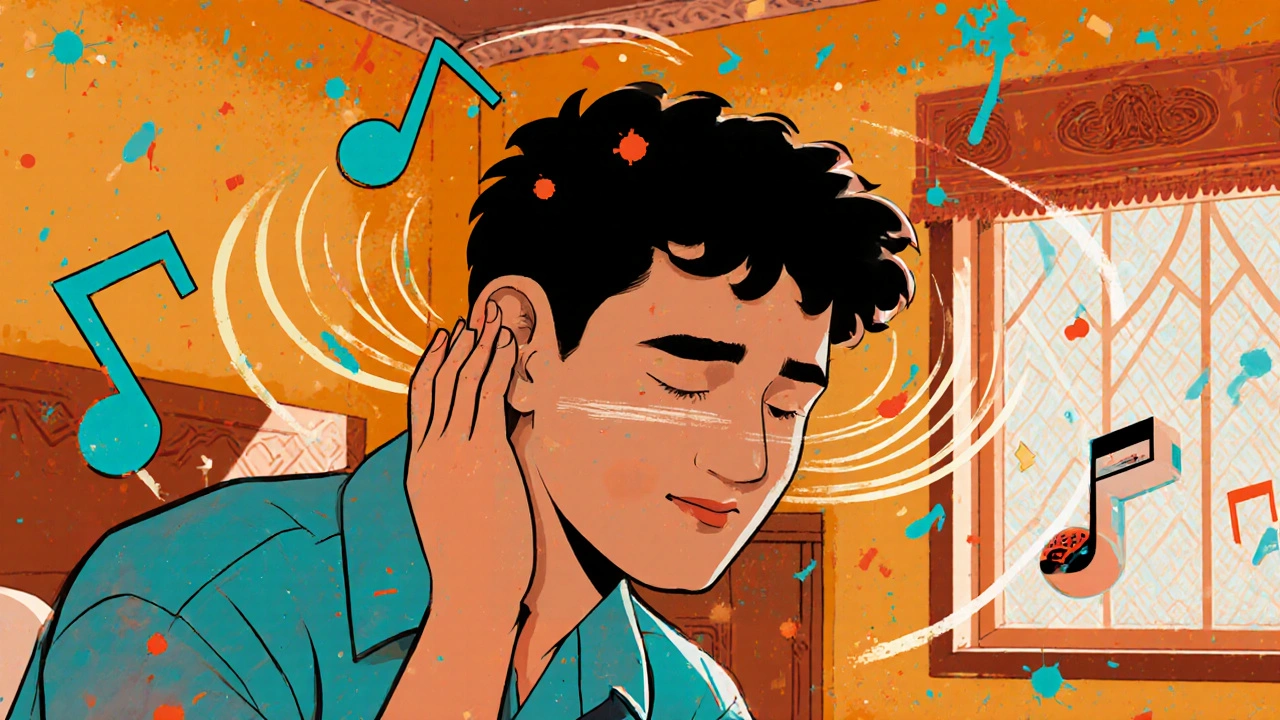Tinnitus Treatment Suitability Calculator
How this tool works
This calculator helps you understand if doxepin might be a suitable option for your tinnitus based on the latest research. It assesses key factors like symptom duration, co-existing conditions, and medications you're taking. Results should be discussed with your healthcare provider before making any treatment decisions.
Answer these questions to assess suitability
Your Assessment Result
Around 15% of adults report a constant ringing in their ears, and many of them have tried everything from sound therapy to dietary tweaks. When you hear that a drug called Doxepin is a tricyclic antidepressant that also blocks histamine receptors might help with that ringing, the curiosity spikes. Let’s break down what the science says, who should think about it, and what the real‑world trade‑offs look like.
Key Takeaways
- Doxepin is an off‑label option for tinnitus with mixed evidence.
- It works by modulating serotonin and histamine pathways, which may calm hyperactive auditory nerves.
- Potential side effects include drowsiness, weight gain, and dry mouth; older adults need extra caution.
- Clinical trials are small; larger studies are still needed before it becomes a first‑line therapy.
- Discussing dosage, monitoring, and alternatives with a qualified clinician is essential.
What Exactly Is Tinnitus?
Tinnitus is the perception of sound- ringing, buzzing, or hissing-without an external source. It often follows exposure to loud noise, ear infections, or age‑related hearing loss. While the condition itself isn’t dangerous, the constant noise can trigger stress, insomnia, and even depression.
How Doxepin Might Calm the Ringing
Doxepin sits at the crossroads of two neurotransmitter systems. First, it blocks the reuptake of serotonin and norepinephrine, raising their levels in the brain. Higher serotonin can dampen the hyper‑excitability of the auditory pathway. Second, its strong antihistamine action reduces histamine‑driven inflammation in the inner ear, which some researchers link to tinnitus spikes. In short, doxepin’s dual action targets both the neural and inflammatory culprits.
What the Research Actually Shows
Most of the evidence comes from small‑scale clinical trials and retrospective chart reviews. A 2017 double‑blind study in 32 participants gave low‑dose doxepin (25mg nightly) for eight weeks. About 44% reported a noticeable drop in loudness, measured on a 0‑10 visual analog scale. However, the same study noted that the placebo group also improved by 28%, underscoring the strong psychosomatic component of tinnitus.
Another pilot trial from 2020 compared doxepin to amitriptyline (another tricyclic). While both drugs reduced perceived ringing, amitriptyline showed a slightly higher average reduction (2.1 points vs. 1.8 points). Side‑effect profiles differed: doxepin users complained more about daytime drowsiness, whereas amitriptyline users reported dry mouth and constipation.
The U.S. FDA has not approved doxepin for tinnitus, which means its use is off‑label. That also translates to limited insurance coverage and less rigorous post‑marketing surveillance for this specific indication.

Who Might Consider Doxepin?
Given the current data, doxepin fits best into a niche group:
- Adults with chronic tinnitus (>6months) who have tried first‑line options like sound masking or cognitive‑behavioral therapy without relief.
- Patients who also suffer from depression or anxiety, because doxepin can address both mood and ear ringing.
- Those who tolerate antihistamines well and do not have a history of severe cardiac conduction issues (doxepin can affect QT interval at higher doses).
It’s generally not recommended for:
- Pregnant or breastfeeding women-safety data are lacking.
- People on other strong sedatives or monoamine oxidase inhibitors, due to interaction risk.
- Elderly patients with glaucoma, because anticholinergic effects can worsen intra‑ocular pressure.
Potential Risks and Side Effects
Like any tricyclic, doxepin carries a side‑effect checklist. The most common include:
- Drowsiness - especially at night; can affect daytime alertness.
- Weight gain - modest but noticeable over months.
- Dry mouth - mitigated with sugar‑free gum or saliva substitutes.
- Constipation - stay hydrated and consider a fiber supplement.
- Orthostatic hypotension - rise slowly from sitting to standing.
Rare but serious events include cardiac arrhythmias, especially in patients with pre‑existing heart disease. Regular ECG monitoring is advised if doses exceed 50mg daily.
How to Talk to Your Doctor About Doxepin
- Prepare a symptom diary. Note when the ringing is loudest, any triggers, and current coping strategies.
- Bring your medication list. Highlight any drugs that affect serotonin or have sedative properties.
- Ask specific questions. Example: “Given my history of depression and chronic tinnitus, could a low dose of doxepin help, and what side effects should I watch for?”
- Request baseline monitoring. An ECG and blood pressure check before starting can catch hidden risks.
- Set a trial period. Agree on a 6‑ to 8‑week evaluation, with a clear plan for tapering if it doesn’t help.
Alternatives and How Doxepin Stacks Up
| Medication | Primary Action | Typical Dose for Tinnitus | Key Side Effects | Evidence Strength |
|---|---|---|---|---|
| Doxepin | Tricyclic antidepressant + antihistamine | 25‑50mg nightly | Drowsiness, weight gain, dry mouth | Small trials, mixed results |
| Amitriptyline | Tricyclic antidepressant | 10‑25mg nightly | Constipation, orthostatic hypotension | Similar to doxepin, slightly higher efficacy in some studies |
| Nortriptyline | Selective tricyclic | 10‑25mg nightly | Less anticholinergic load, but still sedating | Limited data, case reports only |
| Guanfacine | Alpha‑2 agonist (reduces neuronal firing) | 1‑2mg daily | Low blood pressure, dry mouth | Very small pilot studies |
| Melatonin | Hormone regulator, antioxidant | 3‑5mg nightly | Rarely any, mild drowsiness | Moderate evidence for sleep‑related tinnitus |
When you stack the pros and cons, doxepin shines for patients who already need an antidepressant and can handle its sedative profile. If mood isn’t an issue, a lower‑risk option like melatonin might make more sense.
Bottom Line: Is Doxepin Worth Trying?
Short answer: it’s a plausible, off‑label candidate, but not a guaranteed fix. The drug’s dual serotonin‑blocking and antihistamine actions give it a unique edge, especially for those with co‑existing depression or allergic‑type inner‑ear inflammation. Yet the evidence base is still thin, side effects are real, and insurance coverage is spotty.
If you’ve exhausted non‑pharmacologic tools, have a clinician who’s comfortable monitoring heart rhythm, and understand the trade‑offs, a supervised low‑dose trial could be worthwhile. Keep expectations realistic-many users notice only a modest reduction in loudness, not a complete silence.
Frequently Asked Questions
Can doxepin cure tinnitus?
No. Doxepin may lessen the perceived loudness for some people, but it does not eliminate the underlying cause.
How long does it take to see an effect?
Most studies report noticeable changes after 4-8 weeks of consistent dosing.
Is doxepin safe for older adults?
Caution is advised. Doxepin can affect heart rhythm and cause falls due to dizziness, so a low dose and regular check‑ups are essential.
Will doxepin interact with other tinnitus meds?
Yes. Combining it with other serotonergic drugs (like SSRIs) can increase serotonin syndrome risk. Always list every medication to your prescriber.
What should I do if side effects become severe?
Stop the drug and contact your doctor immediately. They may taper the dose or switch to a different therapy.


Comments (14)
CHIRAG AGARWAL
Another pharma gimmick trying to cash in on ringing ears.
genevieve gaudet
So, when you read about doxepin and tinnitus, you gotta ask yourself: is this just another pill or a real lifeline? I mean, the science is kinda shaky, but the hope it gives people is real-like a tiny lighthouse in a stormy sea of ringing. And hey, if you think about it, every culture has its own way to deal with noise inside the head; some use meditation, some use meds. Maybe the real magic is in how we frame the problem, not just the drug itself.
Carissa Padilha
I’ve been digging through the archives of medical journals and the little‑known conference abstracts, and the picture that emerges is far from the neat story the pharma press loves to spin.
First, the sample sizes in most doxepin tinnitus trials are microscopic, sometimes fewer than a dozen participants, which makes any statistical claim shaky at best.
Second, the placebo effect in tinnitus is notorious, often rivaling the active drug because the brain’s perception of sound is so tightly linked to attention and expectation.
Third, the dual action on serotonin and histamine sounds great on paper, but we still don’t know whether the antihistamine component actually reaches the inner ear in meaningful concentrations.
Fourth, a lot of the participants in these studies were also battling depression, so any improvement might be due to mood elevation rather than a direct acoustic benefit.
Fifth, the side‑effect profile-especially drowsiness and weight gain-means that a lot of people silently discontinue the drug without ever telling their doctors.
Sixth, there are hidden funding sources; many of the papers list “unrestricted grants” from manufacturers that quietly influence the conclusions.
Seventh, the post‑marketing surveillance data that the FDA requires for off‑label uses is practically non‑existent, leaving a blind spot for rare cardiac events.
Eighth, some forums report that patients who combine doxefin with over‑the‑counter antihistamines end up with dangerously low blood pressure.
Ninth, the neuro‑plasticity theory suggests that tinnitus may become entrenched after months of chronic ringing, making short‑term drug trials insufficient to reverse the condition.
Eleventh, I have seen case reports where patients felt a temporary lull in ringing after stopping the med, hinting at a possible rebound effect.
Twelfth, the ethical question of prescribing a potent tricyclic antidepressant to someone without a clear diagnosis of depression is still being debated in bioethics circles.
Thirteenth, there’s an emerging body of work suggesting that non‑pharmacologic interventions like sound enrichment and CBT actually outperform drugs in the long run.
Fourteenth, let’s not forget that the inner ear’s blood‑labyrinth barrier is a tough nut to crack, and many systemic drugs simply never get in.
Finally, the bottom line is that doxepin might help a subset of patients, but the current evidence is a patchwork of small, biased studies that can’t be taken as conclusive proof.
Richard O'Callaghan
I think the whole thing sounds definatly like a bandaid fix, but ther's also a risk of over medicating people who just need better sleep habbits.
Joanna Mensch
They're just hiding the real cure behind a pill.
RJ Samuel
Honestly, I'd rather hear the ancient gong therapy that actually quiets the mind than pop a tricyclic that makes you feel like a zombie at 3 pm.
Sara Werb
Look, the whole narrative about doxepin being a miracle for tinnitus is a straight‑up propaganda machine, stuffed with platitudes, buzzwords, and false hope, and it reeks of corporate greed, because who wants to see the public suffer while pharma lines its pockets? The data is flimsy, the side effects are real, and the “off‑label” label is just a loophole, not a stamp of approval!! We need to wake up and demand transparency before more unsuspecting patients get lured into another costly, ineffective experiment.
Steve Holmes
Interesting point, and I totally get the frustration, but let's also remember that for some folks the modest reduction in ringing can be a game‑changer, especially when combined with CBT and sound therapy, so a balanced view might be more helpful.
Tom Green
Indeed, a collaborative approach works best; while the drug alone isn't a silver bullet, pairing it with lifestyle tweaks and regular monitoring can maximise benefits and mitigate risks.
Emily Rankin
In the grand tapestry of human experience, sometimes a tiny thread of relief-no matter how modest-can spark a cascade of hope, turning the relentless buzz into a whisper of possibility.
Rebecca Mitchell
Sounds like a risky gamble.
Roberta Makaravage
📚🔬 Let’s get factual: Doxepin’s antihistamine action is real, but its impact on inner‑ear inflammation remains speculative. 🧠💊 Without larger, double‑blind trials, any claims are premature. 🤔🌟
Lauren Sproule
yeah dont forget to check blood pressure before starting
Samantha Oldrid
Sure, because popping pills always solves everything.